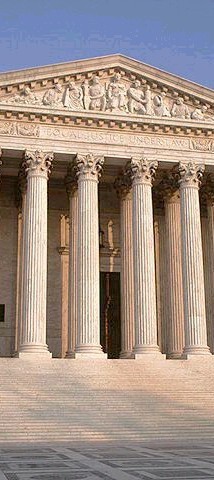Constitutional Amendment
In recent years our form of government has come under strain because the courts have hijacked the legislative process. This blog is dedicated to restoring one of the principles of our form of government; the supremacy of our social contract over the so called "Supreme Court". Our Constitution is part of the contract that holds our people together. It is a social contract that defines the principles that have kept us free and independent for over 200 years.
The social contract started with the Declaration of Independence. The Constitution and the Bill of Rights were simply an extension of this desire to codify what we agreed to in granting this new form of representative democracy power over our lives. The essence of this social contract is respect for and adherence to "the rule of law". The Constitution defines 3 branches; the legislative branch to make law, the executive branch to enforce law and the judicial branch to interpret law.
It was clear when the legislature passed the act that led to "Marbury versus Madison" that there was a need to limit the legislature to adherence to the Constitution. John Marshall was power hungry, but he was given an easy opportunity to expand court power in a just way by the passage of that unjust law. The law in question was an insult to the "rule of law" as expressed in our Constitution since it ignored the rights of individuals contained in the Constitution. It was arguably a Bill of Attainder. It also arguably extended the power to issue a Bill of Mandamus in a fashion that could not be justified by Constitutional powers of congress. The court's "Marbury versus Madison" decision was unanimous because it was so clearly the right decision. Every justice agreed the law being struck was in express conflict with the Constitution. Interestingly, most of the disagreements in the case faded in time, save for the power of the court to rule on the Constitutionality of legislatively passed laws in conflict with the Consitution.
Jefferson opposed the ruling because he saw the inherent risk in one branch claiming it had the sole right to determine the meaning of the Constitution. The idea that only the courts could define the Constitution was potentially demagogic. And so it has become. The courts have hijacked many of the most complex of the social arguments being debated and taken from the legislature the power to have any say. Today any federal judge can subvert the democratic process. Judges rewrite the compromise of laws reflected in our legislative process with impunity and arrogance.
Compromise is the essence of democratically elected representatives passing laws to benefit those who elected them. Judges subvert this compromise process by simply striking out and sometimes changing, not the entire law, but just those parts of the law they dislike. In such an environment, the legislative process has become a joke and elements of society disfavored by a simple majority of the unelected court lose their equal participation in democracy. This is unjust and enrages those so disfavored. It is leading to contempt for our courts.
We must return the balance that for two centuries contributed to the greatness of our nation. The evolving seizure of power by our courts must be ended. This seizure of power, which expanded greatly in the last half of the 20th century, must be reversed. However this reversal of the seizure of power does not mean we should return to the situation before "Marbury versus Madison".
I believe that the original compromise of "Marbury versus Madison" is the best solution for our nation. In that case, the legislature had so transgressed their appropriate bounds that the entire court unanimously agreed it had to be constrained. The ruling forced the legislature to respect the Constitution when they were enacting laws. We must return to that premise, but only that premise. I believe that the only way the courts should be permitted to rule a law unconstitutional is if the Supreme Court (and only the Supreme Court, not a single judge) unanimously agrees and the entire law as passed by the legislature is struck (the representative democracy compromise it represents) and returned to the legislature to try again. No portion of a law can be by itself removed. No political vote by the Supreme Court shall be allowed. If it is not unanimous it is politics, and must be decided by the legislature.
That is the Constitutional Amendment I propose. What do you think?


0 Comments:
Post a Comment
Subscribe to Post Comments [Atom]
<< Home